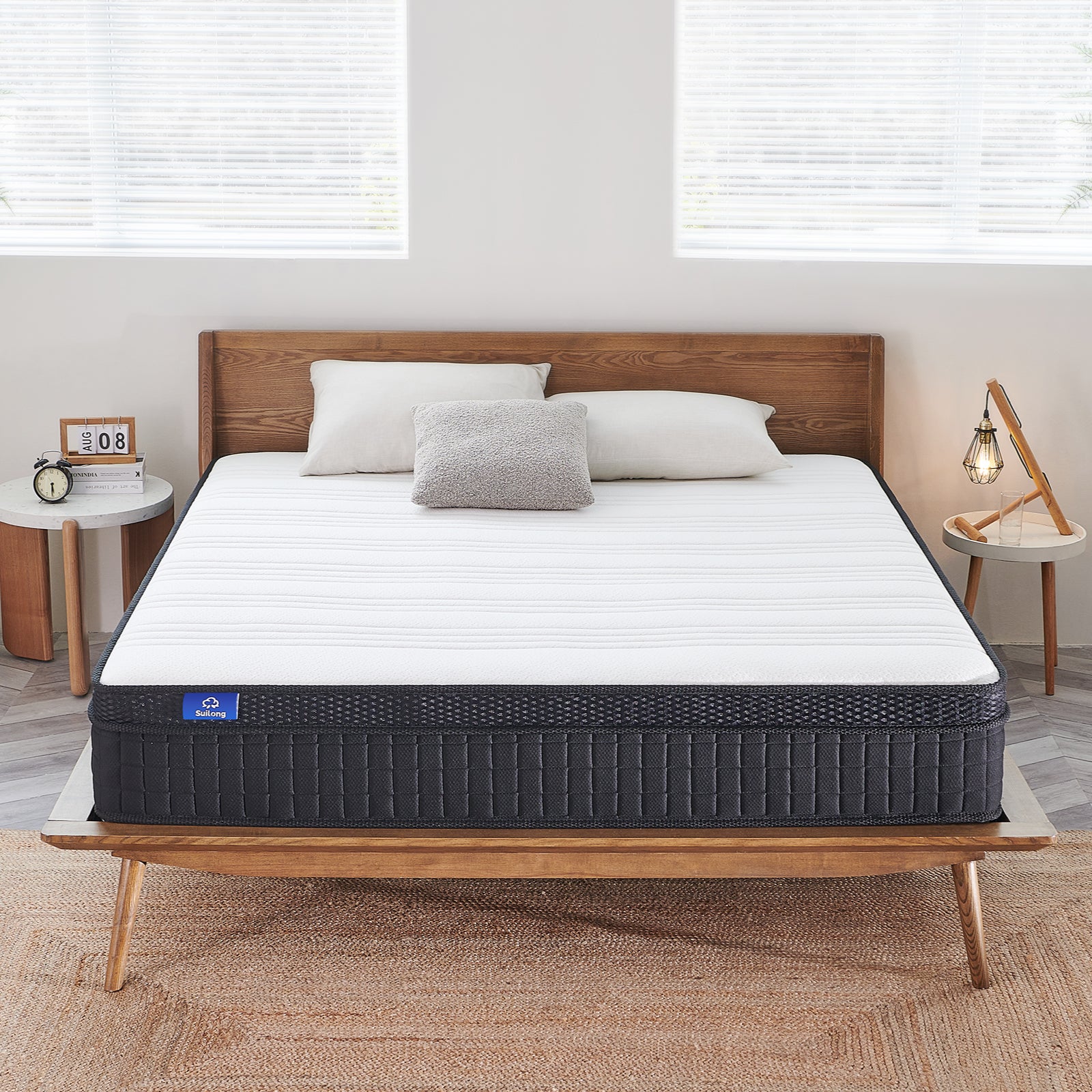Best mattress for kids of 2024: Expert picks for every age

Explore expert picks for the best mattresses for kids in 2024. Uncover the ideal choices recommended by paediatricians, from memory foam to hybrid options, tailored for every age.
1. 2024 Children's Mattress Selection Guide: Why is it important?
Choosing the right mattress for your child is critical to promoting their health and ability to learn. Children need a good night's sleep to support their physical and intellectual development as they grow. Therefore, choosing the right mattress is not only about your child's comfort, but also their overall health.
The relationship between children's growth and sleep
Childhood is an important stage of physical and mental development, and a good night's sleep is vital to their growth. During deep sleep, the body secretes growth hormone, which is essential for children's height growth and weight gain. In addition, adequate sleep helps brain development and enhances memory and learning ability. Therefore, a comfortable and well-supported mattress can help children better enter a deep sleep state, thus promoting their healthy physical and mental development.
The impact of mattress choice on children's health
Choosing a mattress that is suitable for children is crucial to maintaining their spinal health. As children grow, their spine and muscles need to be properly supported. An inappropriate mattress may lead to poor sleeping posture, which may cause curvature of the spine or muscle tension, affecting children's health. In addition, the material of the mattress is also very important. A mattress with poor breathability may cause your child to sweat excessively at night, affecting the quality of sleep.
Latest Mattress Trends and Your Child's Sleep Quality
With the advancement of technology, mattress design in 2024 is becoming more and more health and environmentally friendly. Many mattress brands are starting to use non-toxic, low irritant materials to ensure your child's safety. In addition, mattresses are being designed to be more user-friendly, such as adding breathable holes and temperature-regulating layers to accommodate the specific needs of a child's body. These design improvements not only provide better body support, but also improve the sleeping environment, thus helping your child get a better quality sleep.
When choosing a mattress for your child, parents should pay special attention to the material, support and comfort of the mattress. Next, let's dive into pediatricians' recommendations for children's mattresses.
2. How do pediatricians recommend children's mattresses?
When recommending a mattress for children, pediatricians usually take into account the supportive qualities of the mattress, the safety of the materials, and the impact on a child's growth and development. Understanding these professional recommendations is crucial for parents to choose the right mattress for their children.
Types of Mattresses Recommended by Pediatricians and Why
Pediatricians usually recommend a supportive, medium-firm mattress. This is because a mattress that is either too firm or too soft can affect your child's spinal health. A medium-firm mattress will provide proper support and help maintain your child's proper posture while sleeping. Also, pediatricians will recommend materials that are hypoallergenic and free of harmful chemicals to keep your child safe and healthy.
Recommendations for choosing a mattress based on a child's age
For children of different ages, the choice of mattress will vary. For example, toddlers may need a softer mattress to protect their developing bones, while teenagers may be more suited to a medium-firm mattress to support their rapidly growing bodies. Additionally, durability and waterproofing are also important factors when choosing a children's mattress, considering that children may be playing in bed.
Safety and Health: Essential Criteria for Children's Mattresses
Safety and health are the most critical considerations when choosing a children's mattress. Parents should choose products that meet international safety standards, such as non-toxic materials and fire prevention standards. It is also important for the mattress to be breathable, which can help regulate body temperature during sleep, thus improving sleep quality.
Knowing the professional advice from pediatricians, we will next explore which is better for kids, memory foam or spring mattresses.
3. Memory foam vs. spring mattress: which is better for kids?
Memory foam and spring mattresses are two very popular types when it comes to choosing a mattress for kids. Understanding their respective features and suitability is key to helping parents make an informed choice.
Pros and Cons of Memory Foam Mattresses
Memory foam mattresses are known for their superior body adaptation and pressure relief. They adjust to your child's body shape and sleeping position, providing even support that reduces pressure points and improves circulation. This property is especially important for protecting children's spine and muscle development. However, memory foams are less breathable and may cause your child to feel hotter in the summer.
Pros and cons of spring mattresses
Spring mattresses are favored by many parents for their excellent support and breathability. They provide firmer support and help maintain the natural curve of the spine. In addition, spring mattresses have better air circulation, which helps maintain a cooler sleeping environment. In contrast, however, innerspring mattresses are not as effective as memory foam mattresses in reducing pressure points.
After considering the pros and cons of memory foam vs. spring mattresses, next we'll explore foam vs. hybrid mattresses to see which type is better for your child.
4. Foam vs. hybrid mattresses: the best choice for your child?
Foam mattresses and hybrid mattresses each have their own characteristics when it comes to choosing a mattress for your child. Understanding their strengths and limitations can help parents choose the best mattress for their child.
Suitability and comfort of foam mattresses
Foam mattresses, especially memory foam mattresses, are known for their superior comfort and pressure relief. They are able to provide individualized support based on your child's weight and body type, which helps reduce tossing and turning and improves sleep quality. In addition, the shock-absorbing properties of foam mattresses reduce the noise and vibration generated when your child moves around in bed. However, the downside of these mattresses is that they are less breathable and may not be suitable for children who sweat easily.
Features and Benefits of Hybrid Mattresses
Hybrid mattresses combine the benefits of memory foam and innerspring mattresses and are designed to provide both a supportive and comfortable sleeping experience. These mattresses typically have a layer of memory foam on top and a spring system on the bottom. This combination not only provides stable support, but also keeps the mattress breathable for all types of sleepers. A hybrid mattress is a great option for active children or those with specific sleep needs.
How to choose a mattress for your child's specific needs
When choosing a mattress for children, it is important to consider your child's specific needs. If your child likes to roll over in bed or needs extra support, a hybrid mattress may be a better choice. And for children who need pressure release and gentle support, a memory foam mattress may be more appropriate. Regardless of which type you choose, it's crucial to make sure the mattress meets safety standards and provides proper support.
Next, we'll dive into the 2024 mattress buying guide for kids, including a list of expert recommendations.
5. 2024 mattress buying guide for kids: a list of expert recommendations
When choosing the best mattress for kids in 2024, parents need to consider a variety of factors, including mattress type, size, comfort, and safety. Below is a list of mattress recommendations for children of different ages based on expert opinion and market trends.
Recommended Mattresses for Children of Different Ages
For toddlers, memory foam or medium-firm foam mattresses are recommended, which provide adequate support and are also comfortable and soft enough for children's physical developmental needs. For school-age children and teens, consider hybrid mattresses, as they combine the comfort of foam with the support of springs, making them ideal for growing children.
Consider the Budget: Cost-Effective Mattress Options for Kids
Budget is a factor that many families must consider when choosing a mattress. Cost-effective mattresses are usually made of good materials and are reasonably priced, which is important for families looking to choose a high-quality mattress for their child within their budget. There are many brands on the market that offer quality and reasonably priced children's mattresses that parents can choose from depending on their child's needs and the family's finances.
Key Factors and Common Misconceptions When Buying
When purchasing a children's mattress, in addition to the type of mattress and budget, you should also consider the size and material of the mattress. Choosing the right mattress size not only ensures that your child has enough space as he or she grows, but also avoids the inconvenience of having a mattress that is too big or too small. It is also vital to choose eco-friendly, non-toxic materials to ensure that your child's health is not compromised. Parents should avoid buying mattresses that are too hard or too soft, as well as neglecting the breathability and durability of the mattress.
Now, you have learned how to choose the best mattress for your child. Hopefully, this information will help you make an informed choice to provide your child with a comfortable and healthy sleeping environment.
Read more:
https://suilong.org/blogs/blogs/what-type-of-mattress-is-best-for-belly-sleepers
https://suilong.org/blogs/blogs/what-type-of-mattress-is-best-for-obese-person
https://suilong.org/blogs/blogs/what-type-of-mattress-should-a-side-sleeper-use
https://suilong.org/blogs/blogs/best-mattress-for-heavy-people-2023
https://suilong.org/blogs/blogs/best-mattresses-for-side-sleepers-according-to-experts
https://suilong.org/blogs/blogs/what-is-the-best-mattress-for-hot-sleepers
https://suilong.org/blogs/blogs/what-type-of-mattress-is-best-for-a-side-sleeper
FAQs
Q1: What type of mattress is recommended by paediatricians for children?
A1: Paediatricians generally recommend medium-firm mattresses for children. These provide adequate support for growing bodies and maintain proper spinal alignment. They also suggest choosing mattresses made from hypoallergenic and non-toxic materials for safety.
Q2: Is memory foam or spring mattress better for a child's development?
A2: Both memory foam and spring mattresses have their advantages. Memory foam offers excellent pressure relief and body contouring, beneficial for comfort and support. Spring mattresses provide better air circulation, which is helpful for children who tend to sleep hot.
Q3: Are hybrid mattresses a good option for children?
A3: Yes, hybrid mattresses, which combine the qualities of memory foam and innerspring coils, can be an excellent option. They provide the comfort and pressure relief of foam with the support and breathability of springs, suitable for various sleeping positions and preferences.
Q4: How does mattress firmness affect a child's sleep?
A4: The firmness of a mattress can significantly impact a child's sleep quality. A mattress that is too soft might not provide enough support for the child's body, while one that is too firm could be uncomfortable. A medium-firm mattress is often the most suitable for children.
Q5: Can the wrong mattress affect a child's posture?
A5: Yes, the wrong mattress can negatively impact a child's posture. A mattress that doesn't provide proper support can lead to poor sleeping positions, potentially causing spinal misalignment and discomfort.
Q6: What should be considered when choosing a mattress for a toddler?
A6: When choosing a mattress for a toddler, consider firmness for support, hypoallergenic materials to prevent allergies, and waterproof features for easy cleaning. Also, ensure the mattress fits snugly in the bed frame to prevent gaps.
Q7: How often should children's mattresses be replaced?
A7: Children's mattresses should typically be replaced every 7-10 years. However, it depends on the mattress quality and how well it's maintained. Regular checks for signs of wear and tear, such as sagging or lumps, are recommended.
Q8: Are there specific mattresses for children with allergies?
A8: Yes, hypoallergenic mattresses are available and recommended for children with allergies. These mattresses are made from materials that minimise the risk of allergic reactions, such as organic cotton or natural latex.
Q9: Does mattress material matter for children's health?
A9: Absolutely, mattress material plays a crucial role in children's health. Materials should be non-toxic, hypoallergenic, and free from harmful chemicals. Organic or certified materials are often recommended to ensure safety and health.
Q10: What is the best way to maintain a child's mattress?
A10: To maintain a child's mattress, use a waterproof mattress protector to guard against spills and stains, vacuum the mattress regularly to remove dust and allergens, and rotate it every few months to ensure even wear.


















